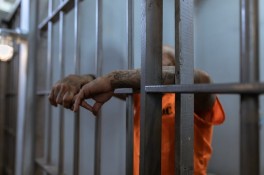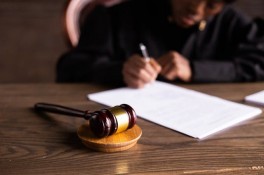A doctor who worked in West Africa with Ebola patients was in an isolation unit in New York City on Friday after testing positive for the virus, becoming the fourth person diagnosed with the disease in the United States and the first in its largest city.
Dr. Craig Spencer, 33, was quarantined at Bellevue Hospital on Thursday, six days after returning from Guinea, unnerving financial markets amid concern the virus may spread in the city. The three previous cases were in Dallas.
Three people who had close contact with Spencer, a physician who volunteered for the humanitarian group Doctors Without Borders, were quarantined for observation. The doctor's fiancée was among them and was quarantined at the same hospital, and all three were still healthy, officials said.
Meanwhile, Nina Pham, one of two nurses infected with Ebola after treating the first patient diagnosed with the disease in the United States, was declared virus-free.
U.S. stock markets shook off Ebola fears on Friday, with the S&P 500 rising 0.5 percent to 1,959.71 by early afternoon. [.N] Stock futures had sold off late Thursday evening after the New York City case was confirmed. U.S. Treasury bonds, which earlier rallied on safe-haven bets, were little changed.
"I think the fears are a bit overdone, said Caroline Vincent, European equities fund manager at Cavendish Asset Management. "In previous cases, such as avian flu, the virus ended up being contained quite quickly."
The worst Ebola outbreak on record has killed at least 4,877 people and perhaps as many as 15,000, mostly in Liberia, Sierra Leone and Guinea, according to the World Health Organization (WHO).
The WHO set out plans on Friday for speeding up development and deployment of experimental vaccines, saying hundreds of thousands of doses should be ready for use in West Africa by the middle of next year.
The Republican-led House Oversight and Government Reform Committee was holding a hearing on Friday to examine the Obama administration's Ebola response, featuring testimony from government officials, a nurse's union representative and a humanitarian group working to control the outbreak in Africa.
REASSURANCE
New York City Mayor Bill de Blasio and state Governor Andrew Cuomo sought to reassure New Yorkers they were safe, even though Spencer had ridden subways, taken a cab and visited a bowling alley between his return from Guinea and the onset of symptoms.
"There is no reason for New Yorkers to be alarmed," de Blasio said at a news conference at Bellevue Hospital. "Being on the same subway car or living near someone with Ebola does not in itself put someone at risk."
Cuomo said that unlike in Dallas, where the two hospital nurses treating Thomas Eric Duncan of Liberia contracted the disease, New York officials had time to thoroughly prepare and drill for the possibility of a case emerging in the city.
"From a public health point of view, I feel confident that we’re doing everything that we should be doing, and we have the situation under control," he said.
Four Ebola cases have been diagnosed so far in the United States: Duncan, who died on Oct. 8 at Texas Health Presbyterian Hospital in Dallas, Texas Health Presbyterian nurses Pham and Amber Vinson, and Spencer.
U.S. health officials said Pham was now virus-free. She had been moved from Dallas to a National Institutes of Health facility in the Washington suburb of Bethesda, Maryland for treatment.
Health officials emphasized that the virus is not airborne but is spread through direct contact with bodily fluids from an infected person who is showing symptoms.
FEVER OF 100.3
After taking his own temperature twice a day since his return, Spencer reported running a fever and experiencing gastrointestinal symptoms for the first time early on Thursday.
He was then taken from his Manhattan apartment to Bellevue by a special team wearing protective gear, city officials said.
Cuomo said Spencer checked into the hospital when he realized he had a temperature of 100.3 degrees Fahrenheit, suggesting he may have caught the onset of symptoms early. Some reports had put Spencer's temperature at 103 degrees, but that turned out not to have been the case.
Spencer was not feeling ill and would not have been contagious before Thursday morning, city Health Commissioner Mary Travis Bassett said.
Owners of the bowling alley he visited said they had voluntarily closed it for the day as a precaution. The driver of the taxi Spencer took was not considered to be at risk, and officials insisted the three subway lines he rode before falling ill remained safe.
"We consider that it is extremely unlikely, the probability being close to nil, that there would be any problem related to his taking the subway system," Bassett said.
SOME RESIDENTS RATTLED
Spencer's case brings to nine the total number of people treated for Ebola in U.S. hospitals since August, but just two, Duncan's nurses, contracted the virus in the United States.
The New York case surfaced days after dozens of people who were exposed to Duncan emerged from a 21-day incubation period with clean bills of health, easing a national sense of crisis that took hold when nurses Pham and Vinson became infected.
As New Yorkers headed to work on Friday, some were unfazed by the news, while others said it added to their anxieties about the perils of living in a crowded city.
Mollie Kirk, a 29-year-old laboratory worker who lives in Manhattan's Harlem neighborhood, walked past a newspaper stand with "Ebola" splashed in large letters across the front pages as she headed toward a downtown subway.
"I'm much more afraid of this year's flu; it kills much more people," she said. "People just mis-evaluate probability and risk because the outcome is horrible. You see the pictures in Africa."
Raschell Martinez, a 27-year-old social worker who lives in the Bronx, said she was "very fearful" after emerging from the subway in Harlem, following what she described as an anguished ride.
"Every time I go in the subway I try not to touch any poles," she said. "People are getting it anyways. And especially the ones who are caring for those with the illness, the nurses, doctors ... despite wearing all this protective gear."
The city health commissioner said Spencer completed work in Guinea on Oct. 12 and arrived at John F. Kennedy International Airport in New York on Oct. 17.
His Facebook page, which included a photo of him clad in protective gear, said he had stopped over in Brussels.
Spencer is due to marry his fiancée, Morgan Dixon, in Detroit on Sept. 5, 2015, according to their online wedding announcement. The couple met in China, where both studied at Henan University, according to their online resumés.
"Craig's friends say he's a goofball, incredible, gifted in both art, music and science, and a go-getter," the announcement says.
Spencer has specialized in international emergency medicine at Columbia University-New York Presbyterian Hospital in New York City since 2011. Columbia said in a statement he had not been to work nor seen any patients since his return.
The CDC did not name Spencer but said he "participated in the enhanced screening" instituted for all travelers returning from Guinea, Liberia and Sierra Leone this month at five major U.S. airports - including Kennedy.
© 2017 Reuters All rights reserved.




